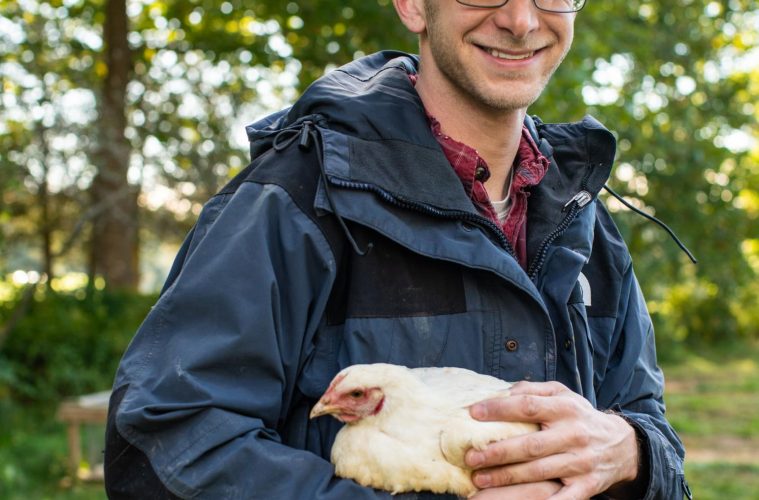Brigades of crimson-wattled, copper-feathered hens forage across acres of pastoral green. Blank-faced blonde chicks patter over pine shavings. Mind-of-their-own birds perch on the hoods of pickup trucks. The chickens that wander all over Grant Family Farm in Essex are quirky, cluck-y creatures who have the uncanny ability to distract bystanders from a truth that Chris Grant knows firsthand: Raising chickens is very, very hard.
“This is something that people romanticize a lot, so there’s a lot of managing expectations for people who think I’m just out frolicking with chickens,” says the 28-year-old Grant, who founded Grant Family Farm and, in recent years, has found his niche selling fresh eggs and chicken. And the fact that there aren’t any other commercial chicken farms in his area has left him to weigh this reality against its implications: What does it really mean to be the only chicken farmer around? “If you’re the only one left, you’re either the craziest one, or you’re really onto something—I’m not sure which one is which yet,” Grant says with a chuckle.
It’s a sardonic take born from a life spent around chickens. After his parents—his father was a firefighter, his mother a hardware store employee—moved to Essex to work at Bothways Farm, Rhode Island Reds and Barred Rocks frequently figured into Grant’s childhood memories. Then, while he was a student at Essex North Shore Agricultural & Technical School, a Future Farmers of America project became Grant’s Plants, the perennial wholesaler he ran until he was 21, in part to offset college costs at the Stockbridge School of Agriculture and UMass Amherst. In 2012, Grant started Grant Family Farm in earnest, and quickly noticed how many other farmers’ market vendors were selling zucchini and summer squash—and how few were selling fresh eggs and chicken. The transition appealed to him, he admits, “There’s nothing worse than picking vegetables and washing them until one in the morning, trying to get ready for a farmers’ market.”
Fast-forward to today, when some 1,500 laying hens—mostly Rhode Island Reds and Red Sex Links—and 5,000 Cornish Cross meat chickens cluck across the acres around him in the span of a year. Each laying hen produces roughly four eggs a week, depending on the season and the weather, from the moment they arrive at 16 weeks old. Broiler hens arrive as chicks, with the flocks staggered so supply remains fresh. Tending to them—raising chicks in brooders, planning six-ton shipments of organic feed each month, ferrying birds half a mile up the road to free-range on a neighbor’s 15-acre pasture, and corralling laying hens into a pair of greenhouses when the temperature dips—is a full-time, rain-or-shine job. Fortunately, his family frequently helps him out. The four acres the chickens mostly forage on are his parents’ property; his mechanic father and brother can fix the most broken-down tractor; and over the years, even his mother has become a far less reluctant chicken farmer. “When she posts pictures of them doing funny things to her Facebook, it’s hard for her to say she doesn’t like them anymore,” he says with a chuckle.
Grant also has an eager clientele willing to pay a premium for his fresh eggs and chicken, which are available at farmers’ markets in Swampscott, Salem, Marblehead, and Roslindale. The textured, lower-fat meat and fresh, electric-orange-yolked eggs overshadow anything you’d find in a chiller on the perimeter of a supermarket. (He notes that while he uses organic feed and practices, his products are not officially certified organic.) “People are more conscious about where their food comes from when shopping at a farmers’ market, they’re more concerned about how animals are raised and treated, but the biggest thing that keeps people coming back is the quality,” he says.
The Grants’ enthusiasm helps offset the hardships of farming, a challenging business whose economics are especially hard to manage with the Northeast’s sky-high land prices. “In Massachusetts, it’s a lot more economical to grow houses than it is to grow chickens or vegetables,” Grant says wryly. At the same time, he cherishes chatting with customers at the farmers’ market and then heading back out for solitary hours in the field, the juxtaposition built into small-scale agriculture. He recalls his brief detour from the agrarian life at age 22: an internship where he whiled away the hours creating content for his employer’s social media feeds—a “dream job for any millennial,” he says, but one that drove him to eat lunch outside in the middle of January just to get away from his cubicle.
“It’s not easy, and it’s not extremely lucrative,” Grant says of a chicken farmer’s life. “But [the reason you keep doing it is] you know in your gut that you’re doing something good. I’m able to do other things than just go into an office and spend eight hours a day stapled to the floor. I don’t know if you can put a price on that.”

